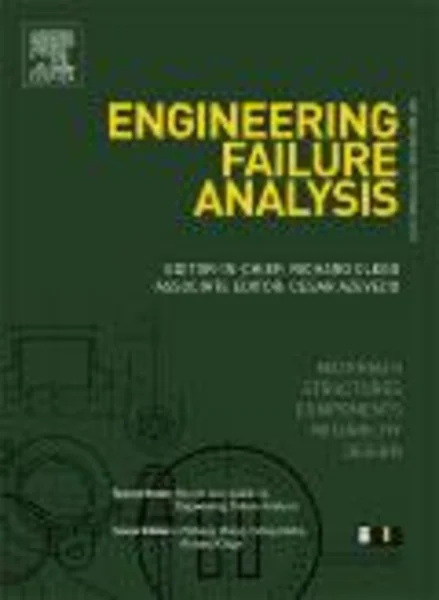-
experimental investigation on the effect of tensile pre-strain on ratcheting behavior of 430 stainless steel under fully-reversed loading condition
جزئیات بیشتر مقاله- تاریخ ارائه: 1390/01/01
- تاریخ انتشار در تی پی بین: 1390/01/01
- تعداد بازدید: 581
- تعداد پرسش و پاسخ ها: 0
- شماره تماس دبیرخانه رویداد: -
in this paper, the effect of the tensile pre-strain on ratcheting process in 430 stainless steel was examined by performing a series of fully tensile–compression cyclic loading tests on the tested material with three tensile pre-strain levels or no prior deformation. the experimental results indicate that a compressive cyclic creep occurs in all applied cases for the tested material without pre-strain. clearly, the observation reflects that the tested material exists the an-isotropic in tension and compression. furthermore, for the tested material with various value of pre-strain, cyclic creep can also be found and the direction of creep deformation is always opposite to that of the given pre-strain. from an experimental observation on the residue deformation produced by cyclic creep, it is found that the stable total compressive creep strain scaled with increasing tensile pre-strains at the same stress amplitude condition. the material with greater compressive creep strain responded to the same applied tensile pre-strain level with higher controlled stress amplitude. exploring the effects of the tensile pre-strain on the stable stress–strain response, this paper has been focused on those items. they are the strain range, δε, plastic strain range, δεp, and plastic strain energy density, δwp at half-life. experimental results show that the material with different tensile pre-strains or without pre-strain had a higher response when the applied stress amplitude range was increased. those indicated material responses have increased at increasing tensile pre-strain. in observation the effects of tensile pre-strain on the fatigue, it is found that the effect of the tensile pre-strain is to reduce the cycles to failure. a decreasing fatigue life is observed with increasing the tensile pre-strain level. in the domain of high-cycle fatigue life (in the range of 105–107 cycles), the effect of tensile pre-strain on degrading fatigue life is obvious and the degree of reducing fatigue life is governed by the magnitude of the stress amplitude. moreover, the damage parameter based on the total plastic strain energy, wf=∑δwp, can produce satisfactory life prediction results for 430 stainless steel with a tensile pre-strain effect under fully reversed tension–compression loading condition.
مقالات جدیدترین رویدادها
-
استفاده از تحلیل اهمیت-عملکرد در ارائه الگوی مدیریت خلاقیت سازمانی و ارائه راهکار جهت بهبود
-
بررسی تاثیر ارزش وجوه نقد مازاد بر ساختار سرمایه شرکت های پذیرفته شده در بورس اوراق بهادار تهران
-
بررسی تأثیر سطح افشای ریسک بر قرارداد بدهی شرکت های پذیرفته شده در بورس اوراق بهادار تهران
-
بررسی تأثیر رتبه بندی اعتباری مبتنی بر مدل امتیاز بازار نوظهور بر نقد شوندگی سهام با تأکید بر خصوصی سازی شرکت ها
-
تأثیر آمیخته بازاریابی پوشاک ایرانی بر تصویر ذهنی مشتری پوشاک ایرانی (هاکوپیان)
-
مینرال شیمی اپیدوت در پهنه های دگرسانی هیدروترمال منطقه ی قمصر، جنوب کاشان
-
همبستگی عزت نفس و پیشرفت تحصیلی در دانشجویان توانبخشی دانشگاه علوم بهزیستی و توان بخشی تهران
-
عملکرد جاذب انرژی تسلیمی در بهسازی لرزه ای ساختمانهای بتن مسلح متداول
-
بررسی میزان بروز عود تشنج در بیمارانی که با اولین تشنج بدون عامل مستعد کننده حاد مراجعه می کنند
-
ارزیابی اثر باد بر روی ساختمان های با پلان مستطیل شکل
مقالات جدیدترین ژورنال ها
-
مدیریت و بررسی افسردگی دانش آموزان دختر مقطع متوسطه دوم در دروان کرونا در شهرستان دزفول
-
مدیریت و بررسی خرد سیاسی در اندیشه ی فردوسی در ادب ایران
-
واکاوی و مدیریت توصیفی قلمدان(جاکلیدی)ضریح در موزه آستان قدس رضوی
-
بررسی تاثیر خلاقیت، دانش و انگیزه کارکنان بر پیشنهادات نوآورانه کارکنان ( مورد مطالعه: هتل های 3 و 4 ستاره استان کرمان)
-
بررسی تاثیر کیفیت سیستم های اطلاعاتی بر تصمیم گیری موفق در شرکتهای تولیدی استان اصفهان (مورد مطالعه: مدیران شرکتهای تولیدی استان اصفهان)
-
شیوه های گسترش اسلام در مغرب اسلامی در دو قرن نخست هجری، اسلام خوارج، اسلام اموی، اسلام شیعی فاطمیان و ادریسیان
-
بررسی تاثیر ارزش بر بازیهای چند نفره گسترده مجازی مورد مطالعه : مراکز خدمات اینترنتی در استان هرمزگان
-
محدوده و آثار اعتراض به قرار منتهی به بازداشت
-
رابطه هوش اجتماعی با سبک های شناختی تنظیم هیجان سازگار در دانشجویان دارای احساس غربت دانشگاه ملی ملایر
-
computational investigation of the efference of different fullerenes on aktogen high energy




سوال خود را در مورد این مقاله مطرح نمایید :